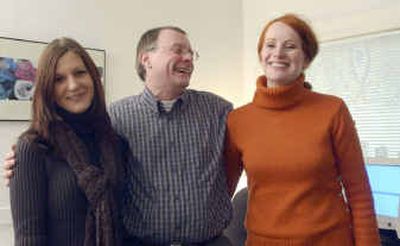Coalition to change hands

KEITH WOLTER INTERPRETS the new job he’s taking in Spokane next year as a bonus for the North Idaho AIDS Coalition (NIAC), which he’s led since 1998.
He’s not abandoning the North Idahoans who test positive for HIV. He’s ensuring their continued care with his new position as program development manager for the Community Health Association of Spokane (CHAS).
CHAS is the clinic that treats North Idaho’s AIDS patients, but NIAC is the organization that helps with the rest of their lives: housing, food, support, transportation. Without NIAC, North Idaho patients would have full care only if CHAS accepted the responsibility.
“It’s in CHAS’ best interest for NIAC to stay healthy,” Keith says. “From downtown Spokane, it’s hard to care about people out of Spokane.”
Keith will leave NIAC Dec. 31, and Dani Mahoney, NIAC’s case manager now, will step in as interim executive director. NIAC had as many as five people on staff in the past few years, but Dani’s staff will consist of one – Dani.
“I’m just going to try to maintain, make sure our 45 clients continue to get what they need,” she says.
NIAC experienced its greatest growth under Keith, and no wonder. He’s a charismatic and good-hearted man whom the Lutheran Church never should have allowed to slip away.
“The board appreciates the contribution Keith made to NIAC,” says Don Heikkila. He’s president of the NIAC board of directors. “One of the greatest benefits was raising the visibility of the need that exists in North Idaho.”
Keith, 48, was a Lutheran minister in Montana when he finally acknowledged his homosexuality to himself and then to the church. The church defrocked him. Montana’s loss was North Idaho’s gain.
He took the NIAC job, which was part-time, to carry him until he found more secure work in the Spokane area. But jobs were scarce and while Keith searched he found himself becoming protective over NIAC’s 11 HIV-positive clients.
“I thought I could do better for them than what they were getting,” he says.
In 1998, North Idaho had no doctors who specialized in AIDS. Two internal medicine doctors in Coeur d’Alene and one in Sandpoint generously accepted NIAC’s patient referrals at no charge. But the treatment was crisis management and not continuous.
New wonder drugs were on the market and Keith wanted them for North Idaho. He wanted to find money to connect HIV-positive patients with specialists who could offer ongoing medical care. He also knew North Idaho had more than 11 HIV-positive residents and he wanted to find them. So he stayed with NIAC.
Keith won grants that assured North Idaho’s HIV patients medical care from an AIDS specialist with CHAS if they had no insurance and no doctor of their own. He needed help, so he called Lewis-Clark State College in Coeur d’Alene and offered an internship. Then he assigned the intern to find as many clients in the five northern counties as she could.
By 2000, NIAC’s clientele had tripled. Keith won another grant and hired Dani to manage cases. She helped gay men, women at risk of contracting AIDS and drug users understand their risk, meet basic needs and find care. She offered support and answers whenever clients needed them. In four years, Dani worked with about 50 people to reduce their risk to society.
By 2002, Keith had hired another case manager and was leading support groups for HIV-positive people and gay men in Coeur d’Alene and Sandpoint. NIAC’s clientele had shifted into three equal-sized groups: gay men, HIV-positive women and drug users.
“We were just flying along,” Keith says. “Then the 9/11 aftermath hit.”
NIAC’s funding evaporated with the national disaster. Federal agencies had money for a growing AIDS problem but not for management of a chronic illness, which was North Idaho’s situation. As grants ended and weren’t replaced, Keith’s staff shrank until he reduced his own hours so he wouldn’t have to cut Dani’s case management time.
CHAS surprised Keith with a job offer last month. It’s not only a good career move, it’s a closer connection for NIAC with medical care for its clients. Keith will work for CHAS, but NIAC owns a chunk of his heart.
Dani will be NIAC’s only paid worker, but three interns will help her.
“I feel lucky to have those interns,” she says.
What she needs most is a continuation of the support Keith masterfully generated for NIAC. The organization has plenty of heart. Money, though, keeps that heart healthy.
“We can’t serve clients without it.” Dani says.